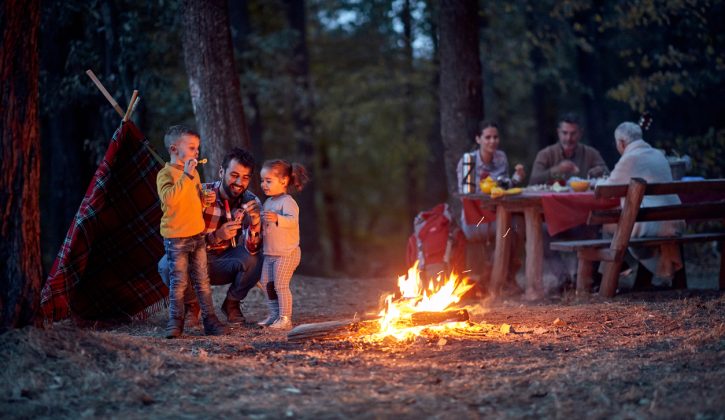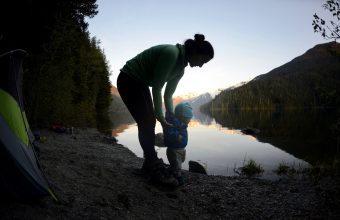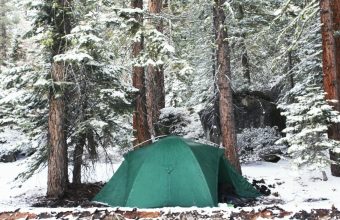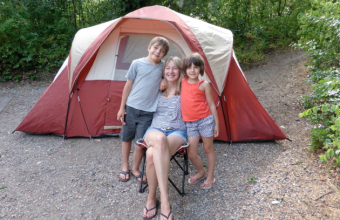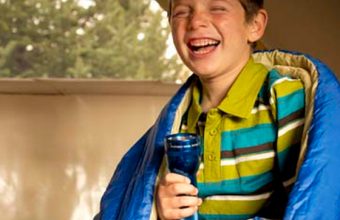If you love camping, you love camping. And if you’ve never camped, it seems daunting. But if you’re looking for local, less-expensive travel destinations this summer, you might want to give camping a try. Another benefit of camping with kids is that you don’t have to worry about dealing with passports and the still-inconsistent rules around vaccinations and masking.
But just what do you need to know when it comes to being one with nature when you have kids in tow? While I was a heavy backcountry camper before having kids, our family has been camping since my oldest was four and my youngest was one. Here are the things we’ve found key to successfully camping with kids.
Tips for Successfully Camping with Kids
Pick a destination
Perhaps the most important factor when it comes to camping with kids is choosing the right destination. If your kids are little or get car sick easily, a spot within a couple of hours of home is probably the best. If your kids are older or don’t mind spending time on the road, you can choose a destination a little further afield. Wherever you land, be prepared to take plenty of breaks for when nature calls or people are hungrier for more than their car snacks. (Side note: pack car snacks.)
When picking a camping spot, consider how remote you want to go and what sort of experience you’re looking for. There are plenty of provincial parks and crown land that offer a rugged, disconnected camping experience. There are also those with electric sites, flush toilets, and showers, that are close to major centres. You can backpack or canoe your gear into a remote site, or simply drive up and set up in a campground. The options are endless, though I must say Ontario has some phenomenal provincial parks.
If you’re new to the idea of camping with kids, a backyard vacation is a great place to start.
Make a list
Just like Santa, when camping with kids you should be making a list and checking it twice (or even three times!) to make sure you have everything you need before heading out. There’s no worse feeling than getting to your site and realizing you’ve left something important – potentially hours away – at home. (This happened to us one year when we got to our site and realized we’d left our youngest’s walking cast for his broken leg at home and had to make the two-hour drive home. Don’t be like us, make a list!)
Start with the big stuff – your tent, sleeping bags, and stove with fuel. But don’t forget the little things either – like bandages in case of scrapes and falls, or dish soap for cleaning up after meals. With Care has an excellent and very thorough essential family camping packing list on their website, for free download.
Pack the night before
Pack as much of your gear the night before, so that you can hit the road early and aren’t dealing with any unexpected fit problems with impatient little travellers hounding you about when you’re leaving. Make sure to pack in-car entertainment for the kiddos, as well as snacks. A portable DVD player or iPad comes in handy for longer trips, and magnetic board games offer plenty of fun. You can always stick to the classics like red car blue car, or I-Spy if that’s more your style. Snacks such as granola bars and fresh fruit are perfect for on the road, and a refillable water bottle is great for in the car and at the campsite.
Meal planning when camping with kids
I cannot stress enough how important meal planning is when camping with kids. It can take longer to cook things on a camp stove or over a campfire than at home, and kids (at least mine) have no patience. You can’t go wrong with basics like cereal for breakfast and sandwiches for lunch. Lots of snacks (chips, cookies, fruit, veggies) will fill in the gaps until dinner. Getting the kids involved in coming up with some meal ideas ahead of time will also get them excited for the adventure.
Some pro camp food tips I’ve picked up over the years include:
- Cook dinners at home before you go and freeze them in containers/storage bags. Once you’re at your site, you only have to heat and eat, and they double as an ice block in your cooler.
- Do not plan to cook dinner your first night. You’re going to be worn out from the trip and setting up your gear, and the last thing you’ll want to do is cook dinner as the sun is setting. Stick with something easy the first night.
- Costco sells huge packages of precooked bacon. Take the precooked bacon. You won’t be dealing with grease in potential bear country, and you can scramble up your eggs that much quicker in the morning.
- Use blocks of ice instead of cubes. When packing your cooler, put a layer of blocked ice on the bottom. This will stay colder and last much longer than cubes.
- Skip the bottled water. If you’re camping at a provincial park, you’re mostly safe to drink the water. There may be a water advisory where you’re heading, so it’s always best to check before heading out. If you’re heading backcountry camping, a water filtration system is worth the investment so you’ve always got safe drinking water without the weight (and waste) of packing in your own water.
- Don’t be afraid of disposable. If you don’t want to mess about with dishes while camping, there’s no shame in taking along disposable plates and cutlery. (Plus, you can burn paper plates in your campfire.)
- Camp food doesn’t have to be boring. Finally, there are so many delicious recipes available online for camp food – whether you’re cooking foil packets on the fire or want something you can walk about with – don’t be afraid to settle for boring food just because you’re camping.
Plan activities
If your kids think they’re “bored” at home, just wait until they’re out in nature, with nary a Netflix show in sight. This is why it’s important to plan activities to keep them busy. Card and board games are always a favourite, as are things like lawn darts or croquet. Check out maps ahead of time to see if there are any hiking trails around.
Provincial parks often run daily visitors programming geared towards families that is informative and fun. At some places you can rent canoes, kayaks, paddle boats, or even bicycles. Some parks have playgrounds (always a must, for our family) where kids can play and make new friends. One thing we’ve found helpful as our kids have gotten older is a good set of walkie talkies. They can have a bit of freedom around the park, and we can check in regularly.
You don’t have to plan every minute – otherwise it won’t be a relaxing vacation – but make sure you have a few fun activities in your back pocket to keep them entertained should boredom set in.
More tips for camping with kids
This certainly isn’t an exhaustive list, but is what our family (and friends) has found helpful while camping with kids. (And camping with a baby is a whole other ballgame.) Some other tips to consider for a smooth experience camping with kids include:
- Pack a favourite toy
- Practice camping in the backyard at home
- Get kids involved in packing, setup, and tear down
- Dress in layers
- Anticipate (and prepare for) potential challenges
- Don’t forget safety
- Keep a positive attitude
- Be flexible
- Embrace the dirt!
Tagged under: camping,family camping,camping with kids
Category: family-life,travel


